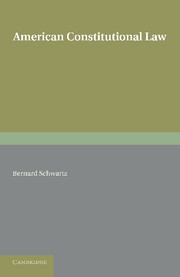Book contents
- Frontmatter
- Dedication
- Contents
- Foreword
- Preface
- PART I THE STRUCTURE
- Chapter I The Bases of the American System
- Chapter II The Federal System
- Chapter III The Congress
- Chapter IV The President
- Chapter V The Courts
- PART II MODERN DEVELOPMENTS
- Appendix: Constitution of the United States of America
- Index of Cases
- General Index
Chapter II - The Federal System
from PART I - THE STRUCTURE
Published online by Cambridge University Press: 05 June 2016
- Frontmatter
- Dedication
- Contents
- Foreword
- Preface
- PART I THE STRUCTURE
- Chapter I The Bases of the American System
- Chapter II The Federal System
- Chapter III The Congress
- Chapter IV The President
- Chapter V The Courts
- PART II MODERN DEVELOPMENTS
- Appendix: Constitution of the United States of America
- Index of Cases
- General Index
Summary
To the English observer, the American constitutional system is sharply difFerentiated from the one with which he is familiar, not only because of the separation of powers between the three departments of government, but, even more so, because of the division of authority between the national and State Governments. The doctrine of parliamentary supremacy is wholly inconsistent with a federal form of government, such as that which exists in the United States. In a federal system, the authority of the central legislature is limited by that possessed by the legislative organs of the governmental units which make up the federation. Such circumscription of power is essential to the functioning of federalism. It is entirely incompatible with the unrestricted sovereignty of Parliament, upon which the working of the constitutional system in Britain turns. ‘The principle, in short,’ states an outstanding English text, ‘which gives its form to our system of government is (to use a foreign but convenient expression) “unitarianism”, or the habitual exercise of supreme legislative authority by one central power, which in the particular case is the British Parliament. The principle which, on the other hand, shapes every part of the American polity, is that distribution of that limited…authority among bodies each co-ordinate with and independent of the other which…is essential to the federal form of government.’
The recognition of this basic difference between the American and English constitutional systems does not, however, of itself enable the outside observer to obtain an accurate picture of the functioning of federalism in the United States. For, as Viscount Haldane, L.C., pointed out in an important case, not all federal governmental systems are alike. ‘In a loose sense the word “federal” may be used…to describe any arrangement under which self-contained States agree to delegate their powers to a common Government with a view to entirely new Constitutions even of the States themselves. But the natural and literal interpretation of the word confines its application to cases in which these States, while agreeing on a measure of delegation, yet in the main continue to preserve their original Constitutions.’
- Type
- Chapter
- Information
- American Constitutional Law , pp. 27 - 48Publisher: Cambridge University PressPrint publication year: 2013



